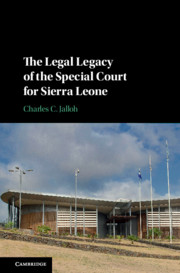(Source: CUP)
CUP is publishing a new book on
the legal legacy of the Special Court for Sierra Leone.
ABOUT THE BOOK
This important book considers
whether the Special Court for Sierra Leone (SCSL), which was established
jointly through an unprecedented bilateral treaty between the United Nations
(UN) and Sierra Leone in 2002, has made jurisprudential contributions to the
development of the nascent and still unsettled field of international criminal
law. A leading authority on the application of international criminal justice
in Africa, Charles Jalloh argues that the SCSL, as an innovative hybrid
international penal tribunal, made useful jurisprudential additions on key
legal questions concerning greatest responsibility jurisdiction, the war crime
of child recruitment, forced marriage as a crime against humanity, amnesty,
immunity and the relationship between truth commissions and criminal courts. He
demonstrates that some of the SCSL case law broke new ground, and in so doing,
bequeathed a 'legal legacy' that remains vital to the ongoing global fight
against impunity for atrocity crimes and to the continued development of modern
international criminal law.
ABOUT THE AUTHOR
Charles C. Jalloh, Florida
International University
Charles C. Jalloh is Professor of
Law at Florida International University and Member, International Law
Commission. He has published widely on issues of international criminal
justice, and in 2018, was the Fulbright Distinguished Chair in International
Law at Lund University and the Raoul Wallenberg Institute of Human Rights and
Humanitarian Law, Sweden. His prior work experience includes as a legal adviser
in the Special Court for Sierra Leone, the International Criminal Tribunal for
Rwanda and the International Criminal Court. He is lead editor of the
Consolidated Legal Texts for the Special Court for Sierra Leone (2007), The
Sierra Leone Special Court and Its Legacy (2013) and four volumes of The Law
Reports of the Special Court for Sierra Leone (2012-2020). He holds degrees
from Guelph, McGill, Oxford, and a PhD in international law, from University of
Amsterdam.
TABLE OF CONTENTS
Preface and acknowledgements
1. Introduction
2. The sierra leone conflict
3. The establishment of the
special court for sierra leone
4. The special court's
jurisdiction, organization and trials
5. Greatest responsibility
personal jurisdiction
6. Forced marriage as a crime
against humanity
7. Child recruitment as a war
crime
8. Head of state immunity
9. Amnesties
10. Special courts and truth
commissions
11. Conclusion
Appendices
Bibliography/Sources Reviewed
Index.
More info here


No comments:
Post a Comment